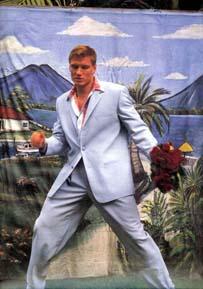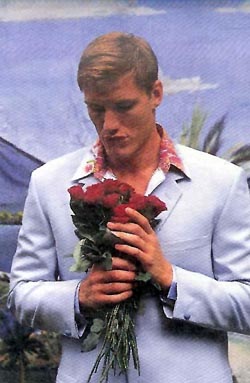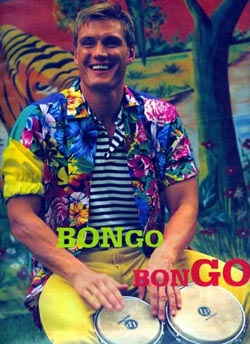

 |
dolph LUNDGREN
The amiable Viking
acts like crazy in Universal Soldier.
by Graham Fuller,
Interview, July 1992
If Dolph Lundgren has a prototype,
it's not the Italian Stallion or the Austrian Ubermensch- it's
the humorous Icelandic hunk, Hans, played by Peter Ronson, who
carries James Mason and Pat Boone under his arms in Journey
to the Center of the Earth. Born in Stockholm in 1959, Lundgren
studied chemical engineering and built himself a karate champ's
body. He made his film debut as a heavy in A View to a Kill,
in 1985, and was then cast as Drago, Sylvester Stallone's blond
Soviet nemesis, in Rocky IV. Subsequent vehicles have
barely given him the chance to extend his range beyond that of
a bargain-basement Superman, but-as with Schwarzenegger-you always
sense some wit rippling beneath the tenement torso. It may emerge
this month in Universal Soldier, in which Lundgren plays
a slain marine resurrected by the CIA as a robotic fighting machine
and turned crazy by vestigial emotions. Co-starring Jean-Claude
Van Damme as his adversary, this big-action spectacle promises
to deliver a one-two box office punch in Tri-Star's summer repertoire.
Proud of his performance, Lundgren promoted the film at this
year's Cannes festival.
I first saw him posing patiently for the paparazzi on a Croisette
beach and met him a day later at the Hotel du Cap, down the coast
at Antibes. The amiable Viking wore tennis whites and spoke modestly
and pragmatically. As we sat down on the terrace, he was approached
by two flaxen-haired French schoolgirls who'd slipped away from
a group of older boys.
GIRL: Can we have your autograph, please?
DOLPH LUNDGREN: Sure. What are your names?
GIRL: She's Stephanie.
STEPHANIE: She's Sophie.
DL: You look Swedish. Where are you from?
STEPHANIE: Oh, Nice. We live in Nice.
DL: [returning two signed napkins] O.K. Thanks.
STEPHANIE/SOPHIE: Thanks! [smiling] 'Bye.
GRAHAM FULLER: How do you get into the mind of a character
like the one you play in Universal Soldier?
DL: The character I play is psychotic. Because he's so crazy
and unpredictable, it makes him kind of comical onscreen. It
was a real stretch for me; I haven't played a character like
that before. It makes you have to get totally out of your mind
so you can just be spontaneous, and the way to do it is to get
very emotional before doing a scene. That way your mind kind
of gets short-circuited, and you can have fun exploring the moment.
GF: To get into that mood, do you think of things from your
past, or do you use your imagination?
DL: Sometimes I use things from my past or things that have upset
me or that even upset me at the time of doing the scene. Or it
can be a simple case of just relaxing-because we hold on to our
emotions by tensing up a lot. But I don't pretend to be Stanislavsky
at this point.
GF: Do you feel that people haven't taken you too seriously
as an actor so far?
DL: Of course. It's a given, if you start the way I did.
I didn't have any training, and it's something I've had to learn
on the job and try to squeeze in, going to class between movies.
Being recognized as an actor who's also an athlete is really
my goal-not the other way around. If I want that recognition,
then I have to prove myself.
GF: And do you think you're getting better?
DL: I am getting better. In the next film I'm doing, The Joshua
Tree, I play a guy on the run who takes a hostage, and she
turns out to be a cop. Again, my character's a little psychotic,
but less so than the guy in Universal Soldier. It's interesting,
because he has a pretty complex background.
GF: Do you get to have a romance in this movie?
DL: Yes. In Universal Soldier my romance is with my machine
gun; in The Joshua Tree it's actually with a woman.
GF: It seems the press wanted to create a rivalry between
you and Jean-Claude Van Damme on Universal Soldier.
DL: Yes, but they always do that. I think competition is good
when you're performing, whether you're an actor or an athlete.
I'm sure it brought a lot more electricity to the set. I think
the cast and crew, apart from both of us, were excited that here
were two guys who were action leads up against each other in
a pretty big movie.
GF: What about the tussle you and Jean-Claude had walking
up the steps to the screening at the Palais des Festivals the
other night? Was that a stunt?
DL: Uh . . . a little bit. It was just something private, really,
but it was no big deal. Nothing to worry about.
GF: How did you first get into martial arts? I believe you
had asthma as a child.
DL: Yeah, I had pollen allergy, and I didn't do many sports because
I really couldn't be outdoors much in the summer. So I studied
a lot. When I got to fourteen or so, I grew out of the allergy
to some extent-1 still have some of it-and wanted somewhere to
channel all my energy. I felt very inadequate. I chose martial
arts because it was different and not many people were doing
it-this was the mid-'70s-and I thought it was something tough
that could impress the girls. I did judo for a while and then
karate.
GF: Was there an anger in you that you had to get out of your
system?
DL: Martial arts, now that I think of it in retrospect, is a
very aggressive sport, and I'm sure I had a lot of anger inside
of me from the wav I grew up. But it also have a beauty about
it, in the body movements; it's circular and flowing, and there
are aspects to it that aren't aggressive. I think that appealed
to me when I was a kid, even though I didn't know exactly why.
When I was about nineteen,
I started training five hours a day in the dojo and competing
abroad, and it became my life. That was what I did-1 didn't go
out or have girlfriends or anything.
GF: You received a Fulbright scholarship to study chemical
engineering at MIT. Do you have any regrets about not pursuing
an academic career?
DL: Oh, a few, but less and less. I always knew that I wasn't
an engineer. I could have been one, but I probably would've been
pretty frustrated and had some mental problems. [laughs] Acting
has relieved a lot of insecurities and tensions I had. So I don't
really regret it right now, no.
GF: How did you first get into movies?
DL: It was from hanging around the set of A View to a Kill, because
my girlfriend at that time [Grace Jones] was in the movie. There
was somebody missing in the cast, and they just asked if I wanted
the part. Afterward the director said, You hit all your marks
and you seem to be a natural. [laughs] I didn't know what I was
doing at the time, but about a year later I started shooting
Rocky IV.
GF: Did you have a happy experience working with Stallone?
DL: He was very helpful and protective of me, because I didn't
know much at the time. I still don't understand how the guy started
with a blank page everyone wanted him to fail, basically, because
it was the fourth Rocky-and wrote it, cast it, directed it, starred
in it, did all the boxing himself, and pulled it off. It was
a big hit. And what he did is not that easy.
GF: Do you feel you have the ability to create your own projects
like that?
DL: First I want to try to feel more comfortable as an actor
and be able to do different sorts of material and make the industry
aware that I can. What that takes, though, is not just acting,
but knowledge of producing and directing and quality control
and publicity and marketing. So I am learning along the way.
The most ambitious thing I'm thinking of doing is a film with
a Swedish historical topic, a period piece, to be shot in Sweden
with a good director. That's something I'd like to do when I
feel I have enough "pull," as they say.
GF: Do you get back to Sweden much?
DL: I go back four times a year, maybe, to get some Swedish food
and just hang out with normal people.
GF: Do you have family there?
DL: Parents and brothers and sisters. They all have normal jobs.
Everybody in my family is normal, not like me. [laughs]
GF: What things are important to you?
DL: [pauses] I'm getting more focused. Each project is more important
to me, and I try to stick to my instincts. And then it's important
to have some sort of stable home base to work from and not go
out so much. When you're in your twenties, you don't give a shit
about anything. When you get above thirty' you start realizing
you're not going to live forever and that you've got to out some
energy into your career and your relationship. And that's what
I'm doing right now. |
|






